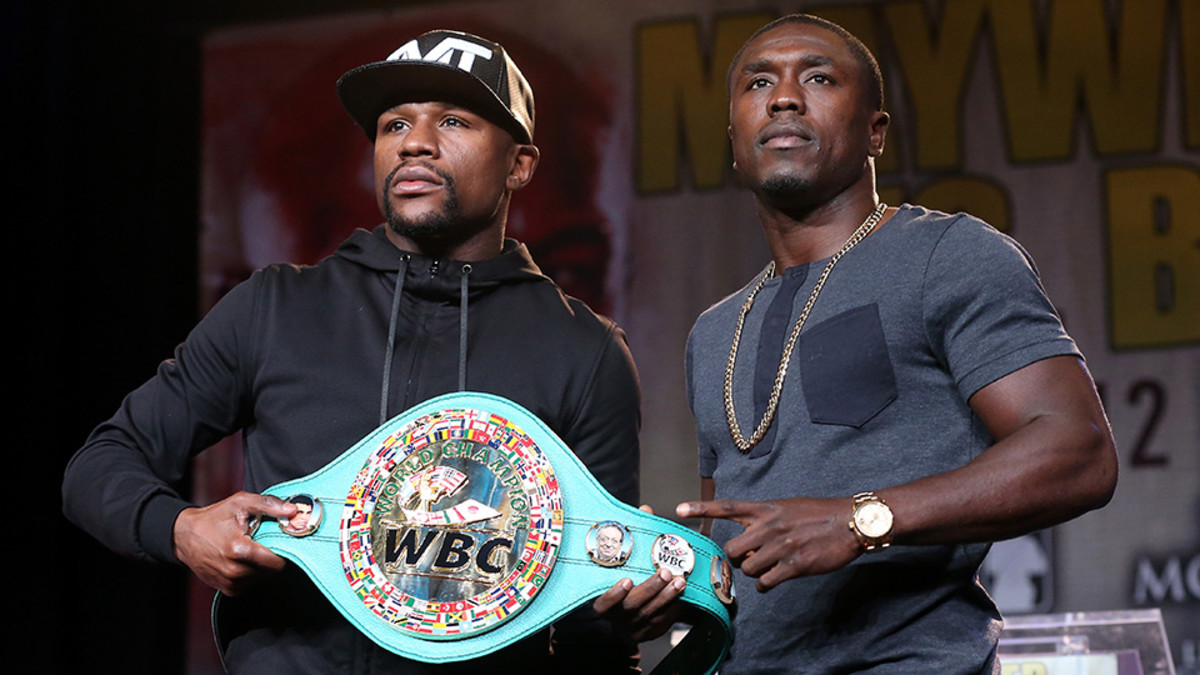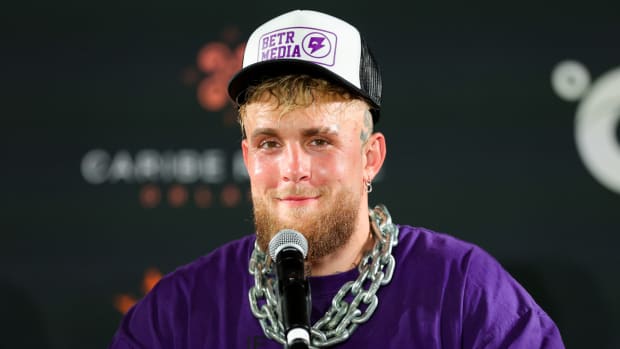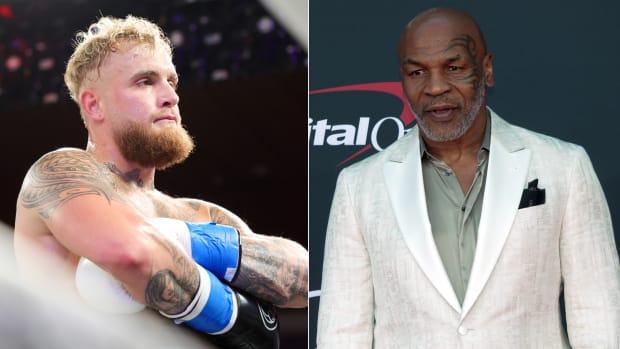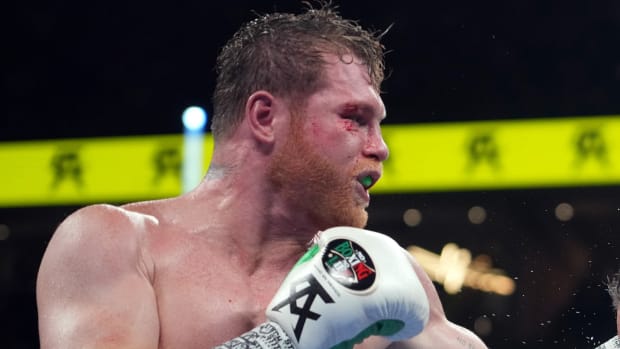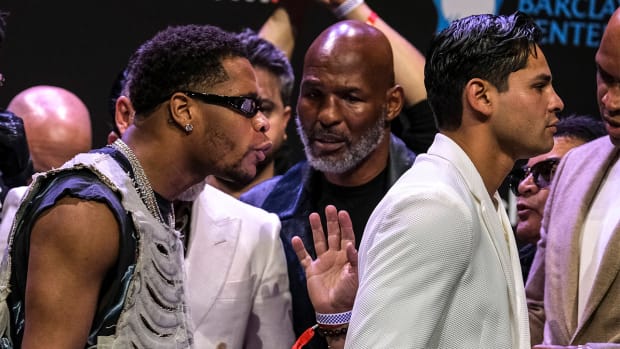Showtime executive Espinoza talks Floyd Mayweather's final fight, more
On Saturday night, Floyd Mayweather Jr. will take on Andre Berto, finishing his six-fight contract with Showtime—and, if he is to be believed, his career. Showtime Sports executive vice-president Stephen Espinoza sat down with SI.com to discuss the Mayweather deal, his controversial final fight and the PBC’s impact on Showtime's business.
SI.com: Five fights down, one to go. What has this Floyd Mayweather deal meant for Showtime?
Stephen Espinoza: There were a couple surprises along the way. One was that I was surprised how easy it was to work with Floyd and his team. I don’t mean to say that we were expecting negative things, but I’d never dealt much personally with Floyd. And so I really didn’t know what to expect in terms of dealing him and his team on a daily basis, business-wise. From that perspective it was much easier than I think anyone expected.
And he has been really professional in every way. He also lived up to his word in every way. I mean, he fought twice a year, exactly on the timetable he said he was going to. He said he was going to take the best available opponents, and certainly there’s a variety of opinions on that. But I look back on the five opponents that we have had already and I have no complaints whatsoever. Obviously two of those five opponents (Saul Alvarez, Manny Pacquiao) are fighters that people doubted that Floyd would ever fight. So in terms of the caliber of the fights, the visibility he has brought Showtime, the elevation of our boxing program overall, we couldn’t be happier.
SI.com: Any other surprises?
SE: I would say I think I was pleasantly surprised by the amount of his involvement. Not just in his own fights, but in even ShoBox events. He’s done several Showtime boxing special edition events for us, and he’s involved every step of the way. I think a lot of people, some people, may perceive Mayweather Promotions as a vanity play for him. It’s not. It’s a real business. He’s there promoting at the event, making phone calls, talking to people, matchmaking on and off TV fights.
Again, it’s not something that has gotten a lot of exposure. It’s not something that we expected. But it’s a pleasant surprise to be someone who operates at his level, as a fighter, and still being involved in off-TV four-rounders as a promoter.
SI.com: You believe you are going to broadcast his last fight?
SE: I’m very confident that we are going to broadcast his last fight.
SI.com: Let me rephrase: Do you think on Saturday you are broadcasting his last fight?
SE: I do. Like many people, I had my doubts about whether this would be his last fight. I say that in past tense, because over the course of the last four weeks, I’ve changed my mind. And part of it, if you look at, I was reminded by the first episode of All Access, we opened up with a scene which took place right after he signed his contract, and he said "Six fights in 30 months, and then I’m done." So if you look carefully along the road, he said it a couple fights ago, "Three more fights and I’m done." Now no one was particularly paying attention at the time. But it’s not strange in retrospect that he’s now saying this is my last fight. And I hear the tone of his voice and the way he sounds and some of the very candid concerns has has voiced about his own health, and the health of Roger [Mayweather, his uncle]. And I think that he’s sincerely reached a point where he sort of feels like he has done everything that he needs to do in the sport.
SI.com: Any thoughts on his legacy?
SE: It’s interesting. I think we will need to wait a couple years. Because if you had asked that question of Oscar [De La Hoya] when he retired, it would have been very different than what people say it is today. You look at someone like Muhammad Ali, who has undergone a complete transformation from where he was at the end of his career to the way he is perceived now. With Floyd, I think because of his persona, and the image, and the flamboyance, there are a lot of negative reactions to that, which cloud peoples’s perception of his career as a fighter and his skills as a fighter. But I think once that emotion wears away, and people look rationally at what he’s done from 130 pounds up to a 154 pounds. It’s tough to say that he’s not one of the all-time greats.
SI.com: His career is going to be known as much for the negativity as the success though.
SE: It has surprised me personally because this is someone who has really elevated the awareness of the sport on a lot of platforms. And you may not like him personally, but he certainly has kept the spotlight on the sport in a major way. He does get criticized unfairly quite a bit. I think a lot of the criticism coming out of the Mayweather-Pacquiao fight I think was unfairly aimed at him. You know, whether it’s because of the persona, or other reasons, he is judged by a different criteria.
SI.com: You have had two monster events (Alvarez, Pacquiao) and three decent ones (Robert Guerrero; Marcos Maidana, twice). Mayweather makes a lot of money for these fights. Has his deal been a financial success for Showtime?
SE: I think there are a lot of misperceptions about the deal and about what will make it a success. Each of the events on its own has been success. Some have been modest successes and some have been monster runaway successes. But I wouldn't be still here in this position, getting the latitude to continue to do big events, if each of those events wasn't a standalone profit by itself.
And I think when people say there have been two monster events, even sort of the tone of your question, I think it is an unfair criteria. Say, O.K., so he's had a couple events which were between 900,000 and a 1 million [pay-per-view buys], and many people will characterize that as either a failure, or something short of successful. Those numbers are still head and shoulders above everybody else in the sport.
And to call those sort of a shortfall or a shortcoming, just illustrates the kind of standards that the people hold Floyd to, when other fighters are celebrated for having much more modest successes.
Floyd Mayweather makes mockery of his own legacy by picking Andre Berto
SI.com: O.K., some criticism has been unfair. But, on paper, Berto is woefully unqualified. What’s your opinion of his final fight?
SE: It was a conundrum. There's a perception that there's a lot of makable quality fights for him. And on this timetable there weren't. Keith Thurman has a hand injury. He's still unavailable. Danny Garcia just had a big fight—he's not going to be in the ring for a while. Kell Brook was a possibility, but from a business standpoint, is he more well known here in the U.S. than Berto? Probably not on the mainstream level.
So when you look at sort of his weight class, there's a lot of names that were thrown out that weren't makable for one reason or another. Tim Bradley—there are obviously promotional conflicts. Amir Khan—
SI.com: Khan is the opponent most people expected.
SE: You know, I don't think it was realistic for Khan to say that he could fast for 30 days and then be ready to fight eight weeks later. If you look at traditionally what it's taking to come back after Ramadan, it's much longer than eight weeks.
My understanding is that he was looking to come back in November or December. So I think that could have generated its own level of criticism for someone rushing back into the ring not fully prepared. But I think that the challenge here is that Floyd is in some ways a victim of his own success. So many people that wanted Floyd to lose were holding out hope that Pacquiao was going to be the guy to do it. And once that didn't happen, and it was a relatively definitive win, then a lot of the intrigue goes away. So like if Pacquiao can't beat him, and then no one's going to beat him. And it's not that intriguing because it becomes a foregone conclusion.
And what also comes out of that is that the bar is raised for what people expect of him in order to be interested or impressed. He's got to fight guys who come in to fight night at 170 or above, in order to impress people and become interested. So in that way it's sort of when you become too dominant, the expectations are raised so high that people expect the impossible of you. The impossible becomes the norm almost.
SI.com: My counterpoint is Floyd transcends boxing politics. If he wanted to fight Tim Bradley—and he is the most qualified available guy—he could have forced a deal. Why not try?
SE: I think that underestimates the challenges of doing business with certain parties. Yes, there were great distances that were bridged for the purpose of Mayweather-Pacquiao, but it was incredibly difficult and in some ways very unpleasant.
Not that anyone should care about that because, at the end of the day, the fan and the consumer got the fight they wanted. But on a sort of short turnaround, to go back into business with parties which are not only suing your representatives, but on which you've had a very unpleasant business relationship, I don't fault [Team Mayweather] for choosing not to go down that road. I understand why the boxing fan may be disappointed at that, but that's certainly one of the realities of the business.
SI.com: Would you like to see a Pacquiao rematch?
Breaking down Manny Pacquiao's injury, lawsuits and future in boxing
SE: I would, but I'm a hardcore fan. And, you know, I'm certainly not an expert on boxing technique and strategy, but personally, I don't see any reason to think that the outcome would be any different. Having said that, it's a matchup for the ages. And I would always want to see it, want to see it as many times as they would do it.
The real question is: Is there a demand for it publicly? And, if the public decides that there's demand, maybe there's enough demand that Floyd comes back for it. I can tell you at this point what I've heard from him is that he's not that interested. I don't think he believes that there's any intrigue in it. And he's removed the mystique around the Pacquiao fight, and I don't think he believes that many people would find it interesting to see him do that again.
SI.com: Going forward, do you expect to have a working relationship with Mayweather?
SE: I expect that he will continue as a promoter. And he has said that that's going to be a major focus post fight. I'll certainly continue to lobby him to return up to a point. At a certain point I'm not going to continue to harass him, but I think the reason why many people are skeptical and the reason why I would continue to lobby him to return, is his skills are still at the top.
As he has said most fighters retire because they don't have a choice. He clearly has a choice. He's operating at a high enough level he could continue for quite some time and still be elite in the sport.
But once someone has given 19 years to a very difficult sport, it's hard to lean on them to say, "Hey, give more." If I look him in the eyes and he says, "My heart's not in it. The grind is too much," that's when I'll stop harassing him about coming back.
SI.com: Moving on, there was a perception that Al Haymon’s Premier Boxing Championships series would have a negative effect on Showtime. Given Showtime’s light 2015 schedule, that perception seems like a reality. Has the PBC negatively impacted Showtime?
SE: I think we all knew that this would be a year of transition. And we weren't really sure what impact it would have. But we're really six months into the PBC business model, so we're only now starting to really appreciate what the plan is. And it's starting to come a little bit full circle.
For example, we'll have Adrien Broner back on Showtime after he's gone and done a couple fights on NBC. We'll very likely have Amir Khan back on Showtime in November. If Peter Quillin wins, we'll have Danny Jacobs and Peter Quillin back in December. We'll have Deontay Wilder back in January.
So the Showtime perspective part of the experiment, so to speak, was always, let's see what happens when we allow some of our guys to go to other outlets and get a different type of exposure. What happens when they come back? What does that do for viewership? What does that do for their popularity?
So the last six months we've only seen Part A of that plan, which is the guys going out. In the fourth quarter of this year and early next year we'll see the second part of the plan, where the guys boomerang, come back to us, and we'll see what that has done for their popularity, the ratings, the viewership, that kind of thing.
So I think it's really premature to say that it's had a negative effect. I think, relatively speaking, we're able to get Adrien Broner on, able to get Amir Khan, Quillin and Jacobs, and Deontay Wilder in the next four months. I think that's a very strong finish to the year.
SI.com: Those guys will eventually go off Showtime again, too. Don’t you need a balanced schedule?
SE: Right. Look, I'm not a huge fan about over-weighting in any particular time of the year. Whether it's first half, second half, first quarter, last quarter. It was an adjustment year. We had CBS bouts that were doing in conjunction with CBS and PBC. We had a lot of adjustment.
PBC was feeling its way. And there're other factors as well, from fights that we tried to make that couldn't be made, to schedule challenges on our own schedule to budgetary considerations. There's a lot that goes on underneath the water level, to use the iceberg analogy, that isn't really apparent. So it's not quite as simple as to say the PBC took all out good fights and fighters away to other networks. Part of the plan was to allow those fighters to leave, but there are also other considerations that come up, too.
SI.com: Do you need things to change in 2016?
SE: We do have conversations about philosophical and strategic conversations. One of the things that I'm a big believer in is consistency. If someone has started to build some momentum on Showtime, you continue to bring them back on Showtime because there is a portion of the audience that is comforted, so to speak, by familiarity.
And consistency and knowing that a guy's going to be back on that network in the near future is something that's good for the fighter and for the network and for the audience. There's a tension between doing that and spreading the guy around to get as much as exposure as you can.
So I tend to favor more consistency. Say you got a guy that you're developing on Spike. Get some consistency on Spike and bring him back a couple times on Spike. I think that's the best way to build those guys. Strategically, philosophically, not everybody agrees with that. But we have those kinds of conversations, especially with the up-and-coming guys, in saying what's the best way to groom this guy into a TV-friendly fighter?
SI.com: What do you think of Year One of the PBC?
SE: I think overall it's a positive for the sport. I never like to really speculate on other people's business models, because when people speculate on ours then generally do it with only partial information.
SI.com: You probably have more information than others though.
SE: I may have a little more, though probably not as much as people will assume. So the way I look at it is ‘What is the impact of the sport and on the boxers themselves?’ And one thing it's done is it's allowed boxers to stay busier, which virtually every boxer likes. That was one of the problems that wasn't immediately apparent when you look at the sport being dependent on paid television, because there's limited dates. And so when you look at all the PBC boxers, there are no problem getting fights and getting fights as much as they want. That's a good thing for the fighters.
The level of awareness and the breadth of outlets, I think, is a good thing for the sport. I went to the [Leo] Santa Cruz-[Abner] Mares fight, which we discussed being on Showtime, and the PBC guys made their case for why they thought it should be on ESPN. It was a decision that we made jointly.
And I knew it would be a good fight, everyone knew it would be a good fight. And sure I was a little bit jealous that we didn't get it. But I think it was a very good thing for that fight and for Abner and Leo. The amount of promotion that they got in the week leading to the fight on SportsCenter and throughout the entire ESPN platform was phenomenal. And it's only going to benefit both of them when they come back.
And if they do a rematch, I'm going to go after it as hard as possible. So I don't want to be so selfish as to inhibit the growth of fighters and the sport, but at the same time we're going to aggressively try to get the best fights that we can.
SI.com: Adrien Broner had a tough year. You are bringing him back next month. He was a star and he has been exposed to some degree. Can he become a star again?
SE: Absolutely. And the reason why is in some senses the reason why guys like Andre Berto are always interesting, or Victor Ortiz—Adrien's much younger than those guys, but what he shares in common is that he's always entertaining. There's never a boring Victor Ortiz fight. There's never a boring Andre Berto fight. There's never a boring Adrien Broner fight.
His style and his persona is not everyone's cup of tea. But I think he does it out of a sincere desire to entertain. There have been missteps along the way, and I’m not here to make excuses or apologize for them. But I never fault a fighter for trying to be entertaining. If that has created some negativity around him, then so be it. That's sort of how he chooses to handle his career is his choice.
But I think regardless of whether he's lost a couple times or not, he's still a top tier guy who is going to attract an audience and going to be entertaining. And so I don't see him as diminished at all. I mean he's lost to two of the best guys (Marcos Maidana, Shawn Porter) in the 147-pound division. That's nothing to be ashamed of.
